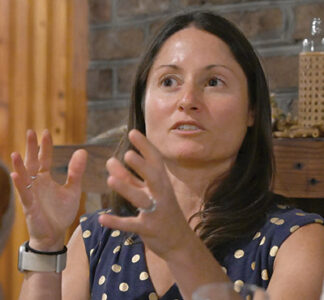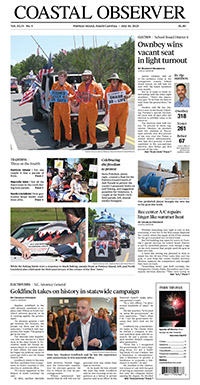Land use
Forum provides talking points for new bid to update comp plan

Lauren Kelly is a study in contrasts.
Her two favorite places are Rome and Jackson Hole, Wyo.; one shaped by buildings, the other shaped by glaciers. One dense, one sparse.
“They both have something in common: people want to go there,” Kelly said.
When she considers the impact of places on the people who live in them, she talks about “Hillbilly Elegy” by J.D. Vance, now a Republican senator from Ohio, and “Just Mercy” by Bryan Stevenson, a human rights lawyer in Alabama.
When she talked about land use at a Coastal Conservation League workshop in Murrells Inlet last week, Kelly illustrated her point with an old postcard of Georgetown’s Strand Theater and a photo of the Guggenheim museum in New York.
“There’s no one-size-fits-all approach to anything,” said Kelly, a land planner who lives in Beaufort. “But you can tell where you are based on the intensity of buildings.”
Georgetown County will resume work next week on an update to the land-use element of its comprehensive plan. The 10-year update mandated by state law was due in 2017. The county started work in 2019, but halted the process in 2021 after Waccamaw Neck residents said there wasn’t enough public input.
The county has hired the Boudreaux Group, a Columbia-based design firm, to complete the process. The first round of public meetings is scheduled next week.
The conservation league, which has been involved in past updates to the land-use plan, hosted Kelly and Lyles Cooper, director of the Pee Dee Land Trust, to provide residents with ideas from other areas.
“I really did learn a lot from both of them,” said Gary Weinreich, a member of Preserve Murrells Inlet and a frequent critic of the county’s land-use decisions.
So did Holly Richardson, the county planning director.
“Beaufort puts a lot of things in practice that planners only hear about in theory,” she said. “We want this to be a plan that can be executed.”
Kelly started her career at the Miami-based firm of Duany Plater-Zyberk, which designed the “new urban” developments I’On in Mount Pleasant and Habersham in Beaufort in the mid-1990s. She moved to Beaufort, living at Habersham, and worked as a city planner before returning to the private sector.
The city of Beaufort uses a “form based” zoning that considers how structures look in addition to considering their uses. Its zoning districts are based on the intensity of development and its character. It emphasizes mixed uses.
“Integrating, rather than segregating, really makes a big difference,” Kelly said.
The typical single-family house generates seven vehicle trips a day. In Habersham, the average is three trips a day.
A mix of housing types also helps reduce traffic. “If people who live here can’t work here, that increases traffic,” Kelly said.
She also talked about the personal benefits. She and her husband started out living in an apartment above a shop. They moved to a condo and then a cottage as their family grew.
“Eventually, we won’t need that must space. Maybe we’ll move back to a condo,” Kelly said.
But they won’t have to leave their community.
Those kind of developments require a large amount of vacant land, Weinreich pointed out, so they would be more appropriate outside the Waccamaw Neck.
“You don’t see too many of those anymore,” Kelly agreed. “There are plenty of opportunities where there is already existing infrastructure.”
Mary Beth Klein, a member of Keep It Green, said the infrastructure on Waccamaw Neck is already stressed by traffic and stormwater.
“Have we reached the limit?” she asked. “Maybe a pause while we catch up?”
Rather than implement a moratorium, Kelly said the community should ask “what can you do with what you have?”
It’s important to identify the areas that have the potential to be developed, the areas that the community doesn’t want developed and the developed places that can be redeveloped for better uses, she said.
“It’s important to be discerning and educated,” Kelly said. “Know why and when to say no.”
She also recommended focusing on each community and small changes.
Cooper went in the opposite direction.
“I’m so tired of working hard for a small impact. We need to think big,” she said.
The political climate in the state has become more favorable for land conservation, particularly with the requirement that local governments begin planning for resiliency to storms and other disasters.
Beaufort County adopted a 1-cent green space sales tax last year.
“This honestly I believe is the best way to go,” said Cooper, who grew up in the Pee Dee and started out working in economic development. “This is where we hope every county will go.”
There are nonprofits that will help communities create land protection plans that can be funded, as Beaufort County has done, with bond referendums.
“There’s got to be land protection to balance out the growth,” she said.
Recommendations for land protection were included in the natural resources element of Georgetown County’s comprehensive plan. A draft of that was approved by the Planning Commission, but tabled by County Council after changes were made by staff. It’s now due to be considered in conjunction with the land use element.
One lesson Kelly learned working for the city of Beaufort was “it’s OK also to be unapologetic. It takes a lot of effort and bravery to do it.” But she said the message to developers needs to be “if you want to be here, you have to do it the way we want.
Georgetown County will hold three public meetings with its consultants, each starting at 5:30 p.m.: Tuesday at the Howard Center in Georgetown, Wednesday at the Murrells Inlet Community Center and Sept. 7 at the Northwest Regional Recreation Center in Choppee.
“We’re going to have some level of growth,” Richardson said. “This will be the opportunity to say what it should look like and where it should be.”
Kelly also noted that Georgetown County’s land-use work has involved a couple of studies and previous workshops.
“It’s important not to get burned out,” she said. “What’s palatable to your community? What will make it stay valuable for the next 100 years?”




